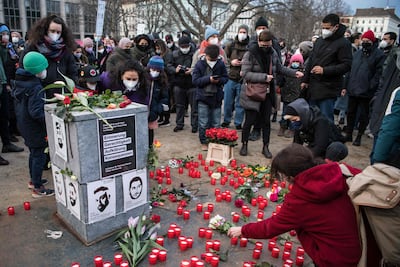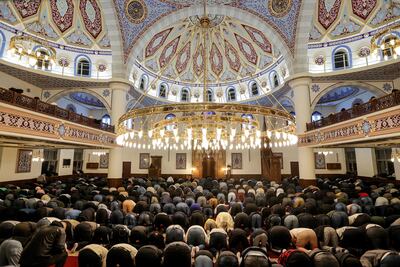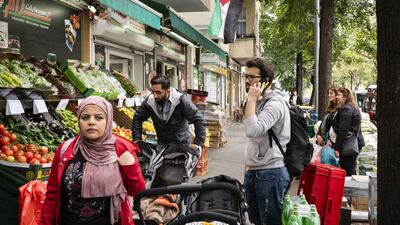Racism against Muslims is a “daily reality” in Germany with headscarf-wearing women facing “particularly drastic” hostility, a landmark report has found.
A three-year study on Islamophobia said Germany’s 5.5 million Muslims face a blanket suspicion that they sympathise with violent extremism.
Children are marked down in tests if they have Arabic or Turkish-sounding names and are typically taught about Islam in the context of conflict and security issues, it said. There were reports of pupils being called "headscarf girl" by teachers.
The report said prejudices about Islam led to women not being taken seriously as individuals, and men being suspected of violence and aggression.
In the workplace, women reported being ordered to take off headscarves, and even Muslims who grew up in Germany and speak excellent German face discrimination when searching for jobs.
The study by a 12-person panel was launched in 2020 as a response to a racist shooting in Hanau in which nine people were killed after a gunman opened fire at shisha bars.
Reem Alabali-Radovan, integration commissioner for German Chancellor Olaf Scholz, said on Thursday that anti-Muslim prejudice and discrimination had taken on a “terrifying scope”.
“Particularly alarming are the findings regarding discrimination and hostility towards women who are visibly Muslim, for example because they wear a headscarf, and are thereby particularly vulnerable,” she said.
“Devaluing and marginalising people does not just threaten Muslims and people taken as Muslim because of their background or appearance, but also social cohesion as a whole.”

Germany’s Interior Ministry said the report “makes clear that anti-Muslim racism is widespread in society and a daily reality”. Interior Minister Nancy Faeser said the government would take action to protect Muslims.
“It is a task for politicians. We need to strengthen education and prevention in particular. At the same time it is a task for all of us in society to ensure we have a good and respectful community,” she said.
Key findings
The 400-page report published on Thursday said:
· About half of Germans agree with Islamophobic statements, for example, that Muslims shun others, are unwilling to integrate or that religious devotion is akin to fundamentalism;
· Physical violence is often not reported to authorities, meaning the level of Islamophobic crime is “probably considerably higher” than police statistics show;
· Muslims mainly appear in the media in negative contexts, especially on television, where there are regular debates about integration but violence against them is rarely discussed;
· Islamophobia appears in theatre, film and museums, with pictures of women in headscarves often used to indicate fictional “ghettos” and exhibitions about Islam dominated by “cliches and stereotypes”;
· Some people in rural areas and in large parts of the former East Germany have little to no contact with Muslims, meaning their views are shaped by hostile sources;
· The far-right Alternative for Germany (AfD) party, which is riding high in the polls, has a “manifestly Islamophobic agenda” but hostility sometimes surfaces in other parties too.
Germany’s Muslim community was historically dominated by people of Turkish origin, many of whom settled in the former West Germany in the 1960s and 1970s after arriving for work.
The picture has shifted in recent years with hundreds of thousands of Syrians arriving during the 2015 refugee crisis. Many people have also moved from Afghanistan, Morocco, Lebanon and Iraq.
The report said practising Muslims were at higher risk of discrimination.
“People who describe themselves as religious, belong to Muslim organisations or wear clothing with religious connotations experience the most severe racism,” it said.
“Headscarf-wearing women report particularly drastic forms of hostility. But it is also evident that merely being regarded as a Muslim based on appearance is enough to experience racism.”

The panel, which was appointed in September 2020, said some prejudices might stem from ignorance and scepticism rather than conscious hostility towards Muslims.
“However, they offer a dangerous breeding ground and a gateway for anti-democratic groups who use Islamophobia to speak to the mainstream in society,” it said.
“Especially in regions where there is a lack of personal contact with Muslims and no corrective to widespread prejudices, these groups can fill space without hindrance.”
An extremism expert told The National this week that the collision of crises in Europe were contributing to the far right's recent success.
The AfD swept into parliament for the first time in 2017 amid a backlash against Syrian refugees, becoming Germany’s strongest far-right party since the Second World War.
A domestic intelligence agency said last week that the party has often portrayed migrants and asylum seekers from Muslim countries as culturally incompatible and prone to criminality.
Germany separately announced last month that crimes motivated by hate and xenophobia had reached their highest level since records began in 2001, although those recorded specifically as Islamophobic were down.


